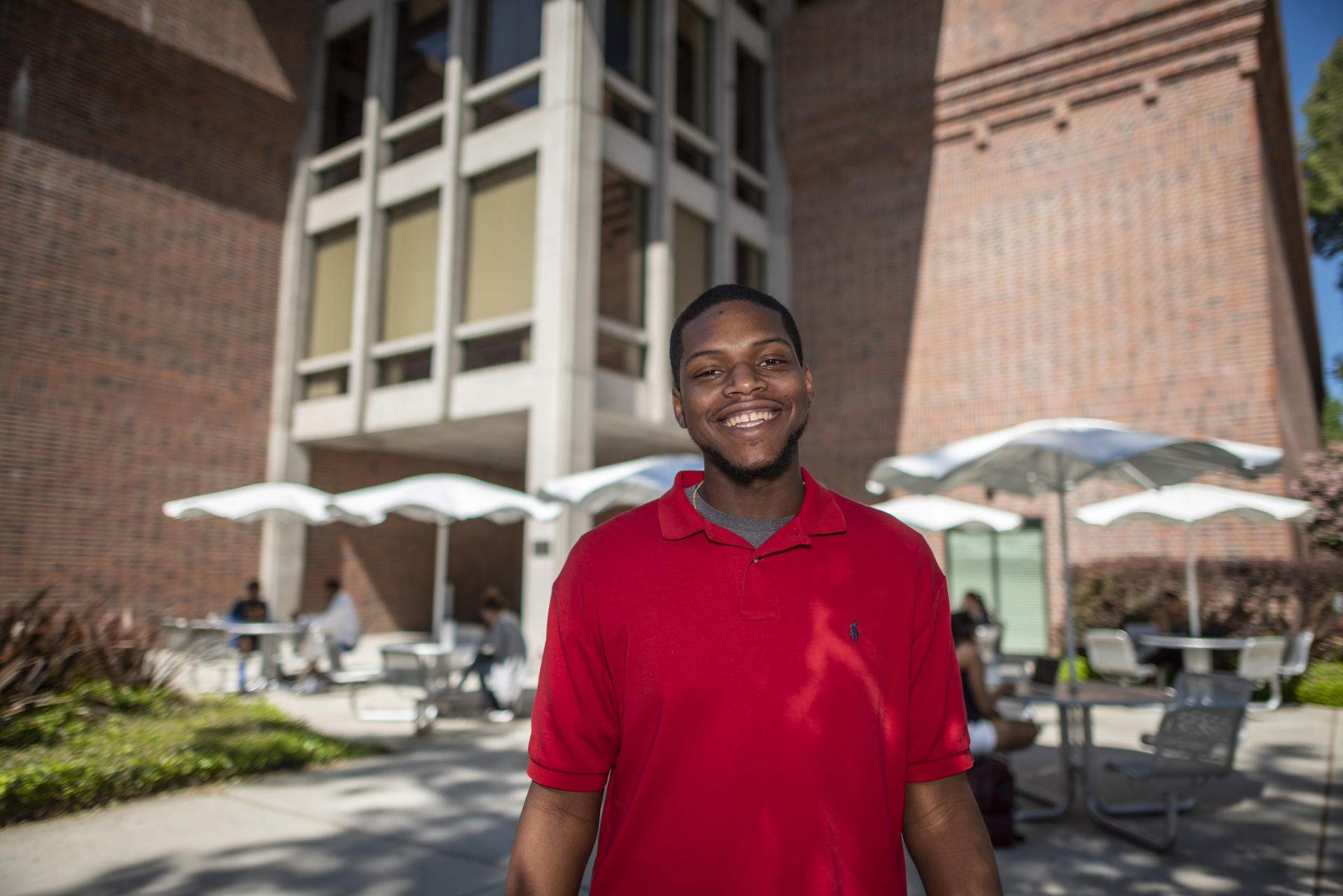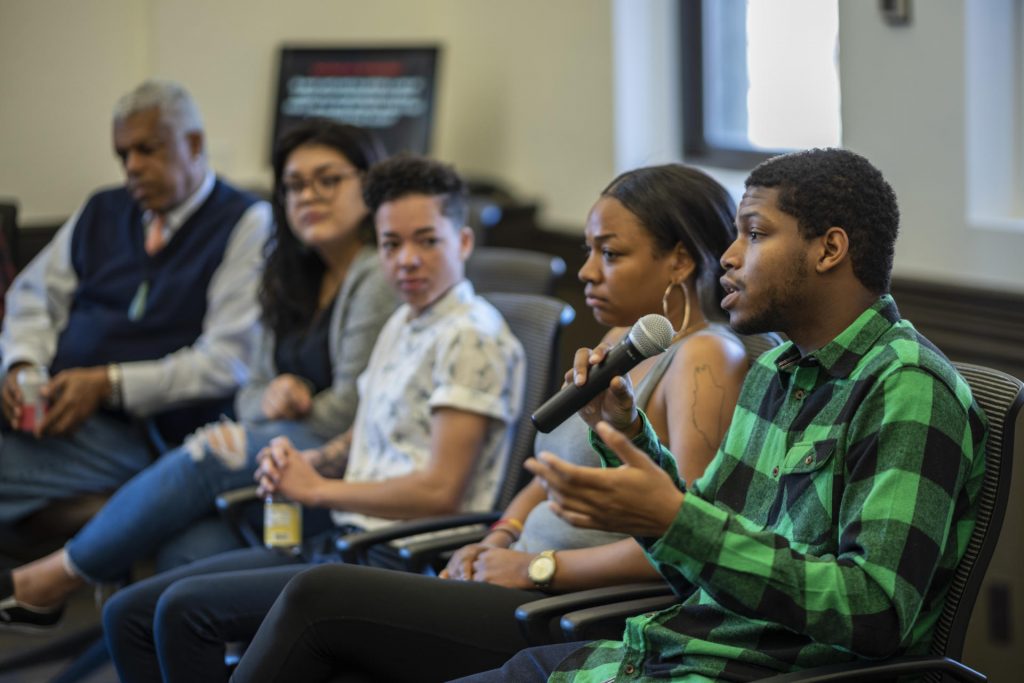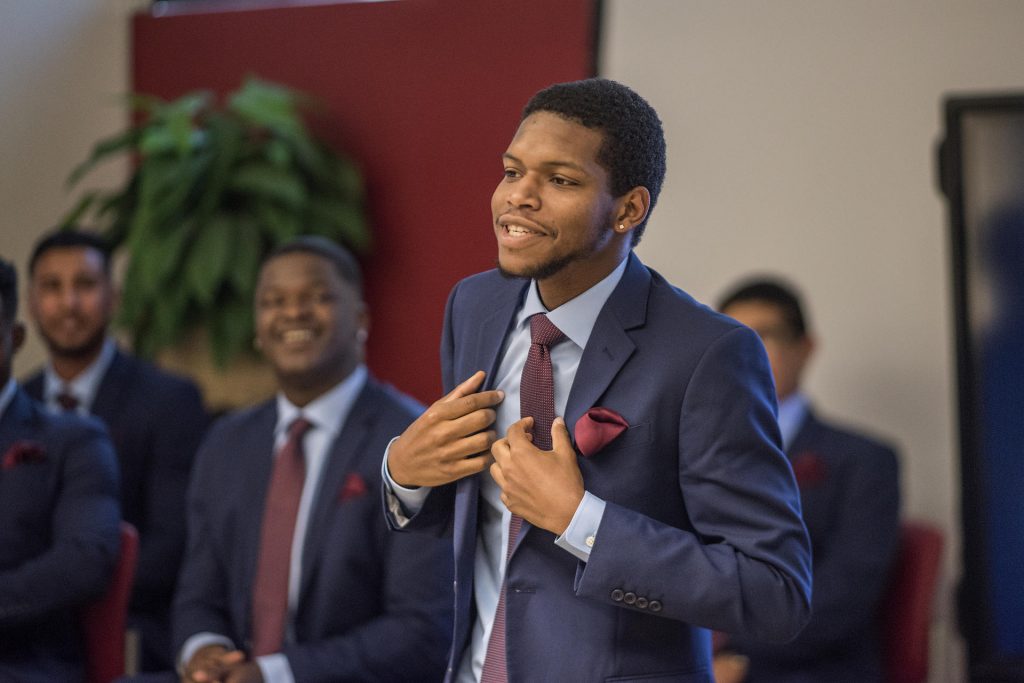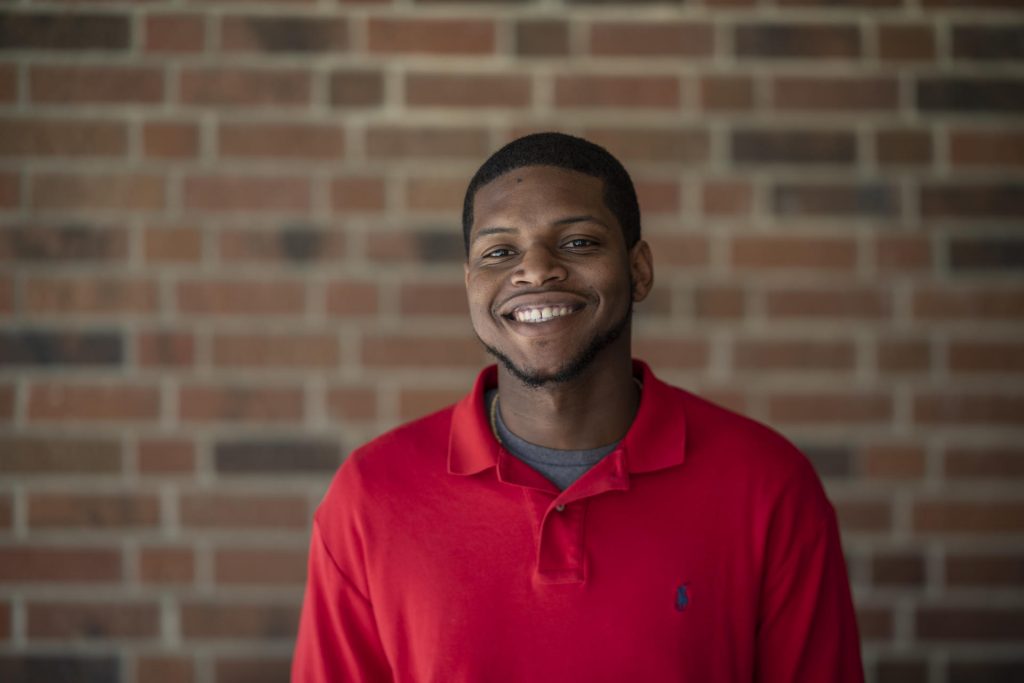Campus Advocate and Mentor Leads with his Heart

Kimani Davis II, who has been active in diversity issues, is photographed on Wednesday, April 24, 2019 in Chico, Calif. (Jason Halley/University Photographer/CSU Chico)
A din of discomfort and tension fill the air as dozens of students, faculty, staff, and administrators sit in Colusa Hall in mid-March to discuss safety concerns. As part of the discussion, University President Gayle Hutchinson and Police Chief John Reid are listening with rapt attention as those who feel particularly vulnerable share their experiences of fear, racism, and discrimination.
Combining confidence and candor, senior Kimani Davis II takes his turn to speak.
Addressing a notion that an increase in uniformed police officers would make most of the campus community feel safer, Davis offers a counter perspective, sharing that a larger police presence could likely make many students feel less safe than ever, given their own unique life experiences and seeing officers’ sunglasses, sidearms, and icy stares.
“We need to know that you’re human beings,” Davis says directly to Chief Reid and without hesitation, “just like we’re human beings.”

Gentle claps and finger snaps follow from attendees. This eloquent and outspoken moment is not unusual for the double major in sociology and multicultural and gender studies. But a few years ago, such extroverted advocacy would have been unimaginable.
“That was one of my fears growing up,” Davis said, “I always felt that something bad would happen to me if I tried to stand in front of too many people.”
But in his time at Chico State, he has realized not only does his voice have power but he also feels an incredible responsibility to speak on behalf of those whose voices are not yet so confident.
So he has stepped out to the forefront, advocating for the diverse communities he supports, like during the spring safety summit or the “We Matter” Candlelight Vigil for this year’s Black History Month events. Davis is also a student coordinator for The Men of CHICO (Culture, Honor, Integrity, Courage, Opportunity), a campus program that aims to empower, guide, and support men of color. And he has interned at Safe Place for the last year, starting a first-of-its-kind series called “Bro Talks” with fellow senior Sam Akinwande, addressing male-only audiences (like fraternities, men’s groups, and athletes) about sexual violence, sexual assault, and consent.

“Kimani is someone who leads with his heart and always wants to make sure people are OK,” said Malcolm McLemore, interim associate director for the STAR Center. “That’s who he is to the core.”
As coordinator of The Men of CHICO, McLemore collaborates with Davis on student programs, so he’s seen firsthand just how deeply the student cares about others in his community, taking time to ask if they’ve finished homework, studied for a test, or if they’ve eaten that day.
Growing up in a low-income household in Inglewood, Davis moved homes frequently in his youth and attended six different schools (including an elementary school in Alabama) by the time he reached high school. His Southern California neighborhood often combusted with gang activity.
“There were days when we couldn’t go to school,” he said. “We had lockouts because there was gang stuff going on around the schools.”
Davis’ bedrock, however, has always been his family, including his parents, two younger sisters, and his aunt and grandmother, who both helped house his family when they didn’t have a place of their own. He kept his focus on academics, and he earned a scholarship to attend a private high school in San Pedro, where he also played football and basketball and sported a 3.8 GPA before arriving at Chico State.
And it was here Davis found the classes, programs, and clubs to satisfy his interests and passion to serve. He worked at the Cross-Cultural Leadership Center (CCLC) and has learned from Program Coordinators Katie Peterson and Krystle Tonga, not to mention founder Charles “CC” Carter. He devoured class material in sociology, multicultural and gender studies, and African American studies. And he was the final speaker at “Take Back the Trail,” a sociology class project in spring 2017 that decried the name of an infamously unsafe footpath connected to campus that perpetuated a rape culture.

“Building a bridge takes both parties. If I’m building a bridge, you have to be willing to accept it. If you’re not willing to accept it, it looks like I’m forcing it upon you.”
For Davis to have become a trusted advocate, ally, and friend as well as a symbol for active listening and an agent of change for so many at Chico State, he has earned an exceptional level of trust. And for many within the University’s diverse communities, specifically communities of color, trust is a hard thing to come by McLemore said. In many cases, it is one of the later things they learn.
“For someone to be trusted and not break that trust and to have continuity in the things that you do and the things that you say, I think is a testament to who he is,” McLemore said.
Rather than push his beliefs on others, Davis engages in conversation and highly values others’ viewpoints. This, he explains, is one way he connects with people.
“Building a bridge takes both parties,” Davis said. “If I’m building a bridge, you have to be willing to accept it. If you’re not willing to accept it, it looks like I’m forcing it upon you.”
Davis’ mind is always busy, thinking deeply about calculus, science, and different aspects of consciousness. He wishes he had more time to paint, draw, and read and write poetry. He can hardly walk anywhere on campus without shaking hands, offering a moment to listen, or wishing a current or former teacher a wonderful rest of the day.
To connect with Davis is to do so with someone who cares for and loves the people around him, values he honed here at Chico State, McLemore said.
“He’s been able to find avenues to support his core values,” McLemore said, “and I think it just helps him to become more and more ingrained and able to do the things that he loves.”
Inheriting his father’s social skills and his mother’s passion to serve, Davis is a mentor to many. He recently accepted a job offer at Boys and Girls Club of the North Valley, but he’s also considering graduate school and he hopes to one day open a student success center to help students envision what they want to do.
McLemore said he often talks about the notion of the “Talented Tenth” within communities of color, the percentage of a rare few who do a little of everything well and lead others in many ways.
“I would say Kimani is probably a 1-percenter in that aspect,” McLemore said. “He’s able to lead in different avenues, do it well and do it genuinely and not separate from who he is. That’s just naturally who he is.”


